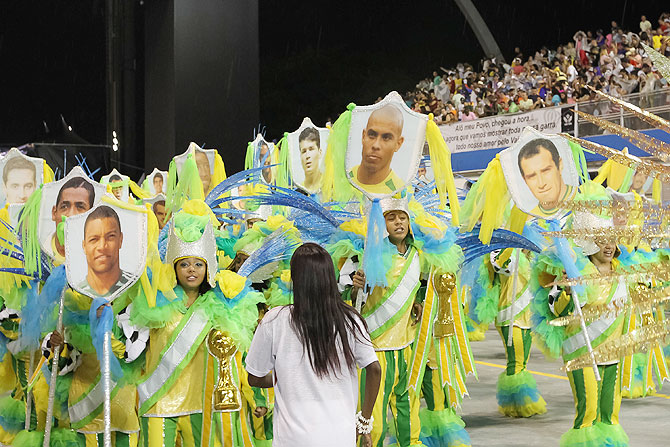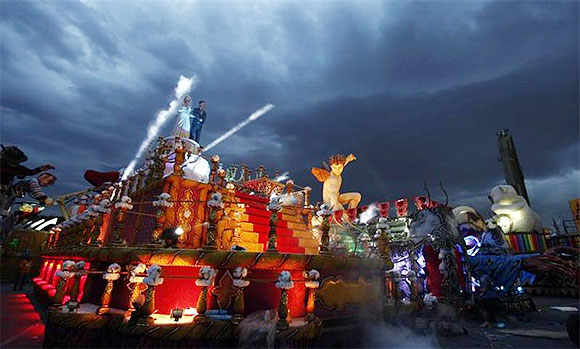Photographs: Ricardo Bufolin/Getty Images
Carnival got under way across Brazil on Friday interspersed with simmering antigovernment protests and alongside preparations in 12 cities for the upcoming soccer World Cup.
The festivities, which each year rouse millions to revel in nearly a week of parades and block parties, are the first since a series of mass demonstrations last June, when Brazilians took to the streets to decry rising prices, a sluggish economy, poor public services and corruption.
Although those protests have ebbed, smaller antigovernment groups have continued to agitate in major cities, sometimes clashing with police.
In Rio de Janeiro, home to Brazil's best-known Carnival festivities, activists in recent days have been rallying members on social media to remind revellers of the issues that riled so many during the earlier demonstrations.
While they are unlikely to spoil the occasion for the nearly 5 million partiers expected, protests would provide a novel counterpoint to the gaiety, more traditionally marked by mass debauchery, litter-strewn streets and occasional vandalism.
Last year's demonstrators successfully used a widely watched warm-up tournament for the World Cup as a stage to contrast the billions spent on the soccer event and the 2016 Rio Olympics with Brazil's feeble investment in public services.
With the World Cup itself starting June 12, activists are eager to rekindle the anger and angst. "Revellers unite!" wrote one in an online manifesto for a group dubbed "Occupy Carnival," whose aim is to "contaminate Carnival with the spirit of popular protest."
Carnival gets going amidst Brazil World Cup protests
Image: Lights and smoke are tested in a carnival float at the Rosas de Ouro Samba School, in preparation for the annual carnival parade in Sao Paulo on ThursdayPhotographs: Paulo Whitaker/Reuters
Rio and other major cities are well accustomed to activities of any stripe during the festival - from good-humoured parades by transvestites to swarms of beachcombing bandits.
The Rio state government said it would deploy nearly 17,000 police officers, 16 percent more than it did last year. Earlier this week, the government showed off new riot gear and body armour that officers will be donning for any unrest.
Friday morning, shopkeepers in Ipanema, a beachside Rio district popular with tourists, had already boarded up windows to protect their inventory. In Salvador, the north-eastern city where throngs follow massive mobile stages along 25 kilometres of closed avenues, local media broadcast a smartphone video of a group of revellers beating a suspected thief.
Meanwhile, authorities in the dozen host cities for the upcoming soccer games are scrambling to finish stadiums, public works and other preparations. In Rio, where officials recently demolished an elevated highway and rerouted much of the traffic across the city centre to make way for new infrastructure, locals were anticipating worse-than-usual gridlock.
Still, the overall atmosphere is expected to remain festive throughout Carnival, a tradition whose history lies in a final binge of sin before the austere Catholic season of Lent. Beer and liquor advertisements began blanketing the city in recent days, while government workers staffed stands to hand out free condoms.
Friday morning, Rio Mayor Eduardo Paes relinquished the key of the city to Rei Momo, the figurehead king of a celebration taken so seriously in Brazil that many businesses close. The stock exchange in São Paulo, the country's biggest city and financial capital, halts trading during the event from Monday through mid-day Wednesday, Carnival's traditional end.




Comment
article